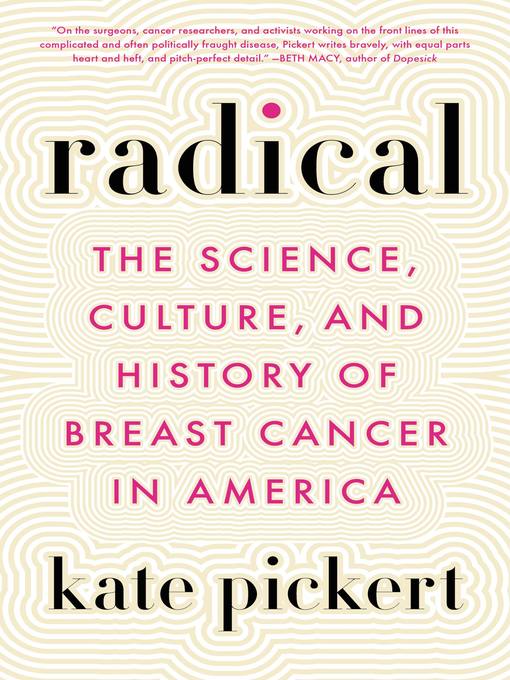
Radical
The Science, Culture, and History of Breast Cancer in America
علم، فرهنگ و تاریخ sTه در آمریکا
کتاب های مرتبط
- اطلاعات
- نقد و بررسی
- دیدگاه کاربران
نقد و بررسی

August 26, 2019
Pickert, a Loyola Marymount College journalism professor, delivers a compassionate, lucid, and well-researched account of historic and ongoing attempts to combat breast cancer. Woven into Pickert’s evenhanded narrative is her own story of being diagnosed with the disease at age 35 and navigating options for dealing with a particularly aggressive form. For all the efforts directed toward breast cancer awareness (“it seems there is not a consumer-product category in America that is pink-ribbon-free”), she finds that many people know relatively little about it. To illuminate the great progress that’s been made in treatment and the many challenges that remain, Pickert pays visits to a UCLA operating suite, to observe a bilateral mastectomy and reconstructive surgery, and to the sprawling campus of the nation’s first biotechnology company, Genentech, to learn about its drug development efforts. She interviews Dr. Larry Norton, “arguably the most influential living breast cancer doctor in America”; Dr. Laura Esserman, head of a large-scale trial aimed at updating breast cancer screening norms; and a slew of epidemiologists, patients, and advocates. A skilled and thorough journalist, Pickert crafts a comprehensive and up-to-date account of a disease that strikes one in eight American women. Agent: Richard Pine, Inkwell Management.

September 1, 2019
Healthcare writer Pickert (journalism, Loyola Marymount Univ.) documents being diagnosed and treated for breast cancer, and chronicles the historical medical time line and challenges of the current medical establishment around this type of cancer. The author covers screening, diagnosis (types of breast cancer), treatments, the doctors' role, understanding medical statistics, reconstruction, and the increasing involvement of nonprofits. She further highlights several currently contentious issues, such as whether to screen and when, and the sometimes starkly different treatment protocols chosen by practitioners on the East and West Coasts. Pickert believes the mixed messages patients receive on these topics are counterproductive. The underlying message is for patients to be their own advocates in the swirl of their personal medical journey. This is a helpful book for learning about the general history of cancer treatment developments and specialists' best practices. VERDICT Combining historical research, interview information, and personal accounts, Pickert creates a well-rounded and informative overview of breast cancer and its many treatments. Her book leaves readers hoping that progress will continue in a positive direction.--Elizabeth J. Eastwood, Los Alamos Cty. Lib. Syst., NM
Copyright 2019 Library Journal, LLC Used with permission.

September 1, 2019
In-depth coverage of breast cancer from a health care journalist and survivor. "In addition to being the most public of all the cancers," writes Pickert (Journalism/Loyola Marymount Univ.), "carcinoma of the breast may be the most thoroughly studied malignancy in human history." In her first book, the author explores the history of the disease and its many variations, the progression of treatment regimes, and the cultural awareness that has developed thanks to individuals and big corporations participating in pink-ribbon campaigns. As a health care journalist, Pickert was interested in the subject, but it became even more important when she was diagnosed with an aggressive form of the cancer at the relatively young age of 35. She interweaves the story of her own treatment schedule with the historical, cultural, and scientific data she collected on this well-documented carcinoma. The narrative is informative and personable and thankfully never maudlin or melodramatic. One of the more controversial topics Pickert explores is mammograms: how early women should begin having them, how often, and whether there is a better way to identify cancer cells at an early stage so women can get the best treatment possible. Readers learn about the extremely radical surgeries performed in the late 1880s, which often left women deformed, as well as the latest studies, which provide treatment based on an individual's genetic and family history. Pickert addresses the development of effective drugs, including both synthetics and those derived from plant and tree bark. "As I type this sentence," she writes, "1,823 federally registered breast cancer clinical trials are actively recruiting patients." She also includes information on men with breast cancer, an underdiscussed topic. Though not comprehensive, the book provides readers with a wide range of information to help those with breast cancer and their support groups make the most effective decisions for their own treatment. A useful text on a well-known cancer bolstered by the author's personal perspective as a survivor.
COPYRIGHT(2019) Kirkus Reviews, ALL RIGHTS RESERVED.

























دیدگاه کاربران